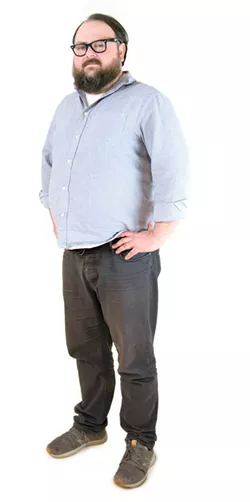If you've been to a late-night concert at the Baby Bar in the last five years, the odds are good that Jeff Glinski helped book it.
Glinski works full-time as a teen drug abuse counselor at Excelsior, but he's also regularly booking about 40 to 50 shows a year at the downtown spot, bringing garage-rock and punk acts that he says would typically pass Spokane by.
A Spokane native, Glinski, 35, has been involved in the local music scene since he was a teenager, become an in-demand drummer as a member of surf instrumentalists BBBBandits and the psych-rock project Mirror Mirror. His newest band, Ex Pets, has its first show on Friday night at the Baby Bar.
This interview has been lightly edited for length and clarity.
INLANDER: Can you tell me about your musical background?
GLINSKI: It's funny, my mom told me the other day that I used to watch The Monkees, and I would go, "I want to have my own musical show when I'm older." I have no recollection of that, but I've just always wanted to play music. I've just learned from doing it and watching people. It's an excuse to hang out with my friends, and it's definitely an outlet. I've learned my values from the music culture.
Have you always been a drummer?
No, I started out as a guitarist. I've played bass in bands, I've sung in bands. But I like drums. That's where I'm staying. I didn't have my own set for a long time, so I called myself a weekend drummer, just playing on the side.
You've been a part of the music scene for two decades now. In what significant ways have you seen it change?
Even five years ago, we were lucky to get 20 people out [to a show], and we were so excited. It's hard in Spokane finding support and a reason to keep going on. A lot of people will start getting a little traction, and then they hit that slump, and it breaks so many bands. And then the Bartlett came, and the Big Dipper was starting to do stuff, and there was more of a demand.
Where do you see the scene going in the next few years?
With our increase in size, I hope people will still value the DIY aspect of it, where they don't have to pay $20 for a ticket and can see bands before they're another blip on the map. Just giving people opportunities to be themselves and do weird stuff.
What's your process for booking a band?
It's like a curation type thing. I reach out to them, and now that I've networked, it's getting a lot easier. I have so much support from my wife, because when we book, we do it European-style. So I not only try to get them paid and fed at the Baby Bar, I put them up that night, and a lot of times we do breakfast in the morning. I've also had friends step in and host bands, which is extremely helpful. I don't want to bring somebody here and then say, "No, you can't stay in my house." It's reaching out to them and offering that security, especially if they're coming to a place where they don't know anybody.
How do you decide which bands to reach out to?
I listen to my community. What are they listening to? What are they liking? What are they sharing on their social media? I will directly go to people and say, "You will like this band." And usually they trust me and they come out. [Laughs] I'm trying to get diverse stuff, being able to bring weird art projects, stuff that has pop sensibilities to it but is still kinda weird. ♦

